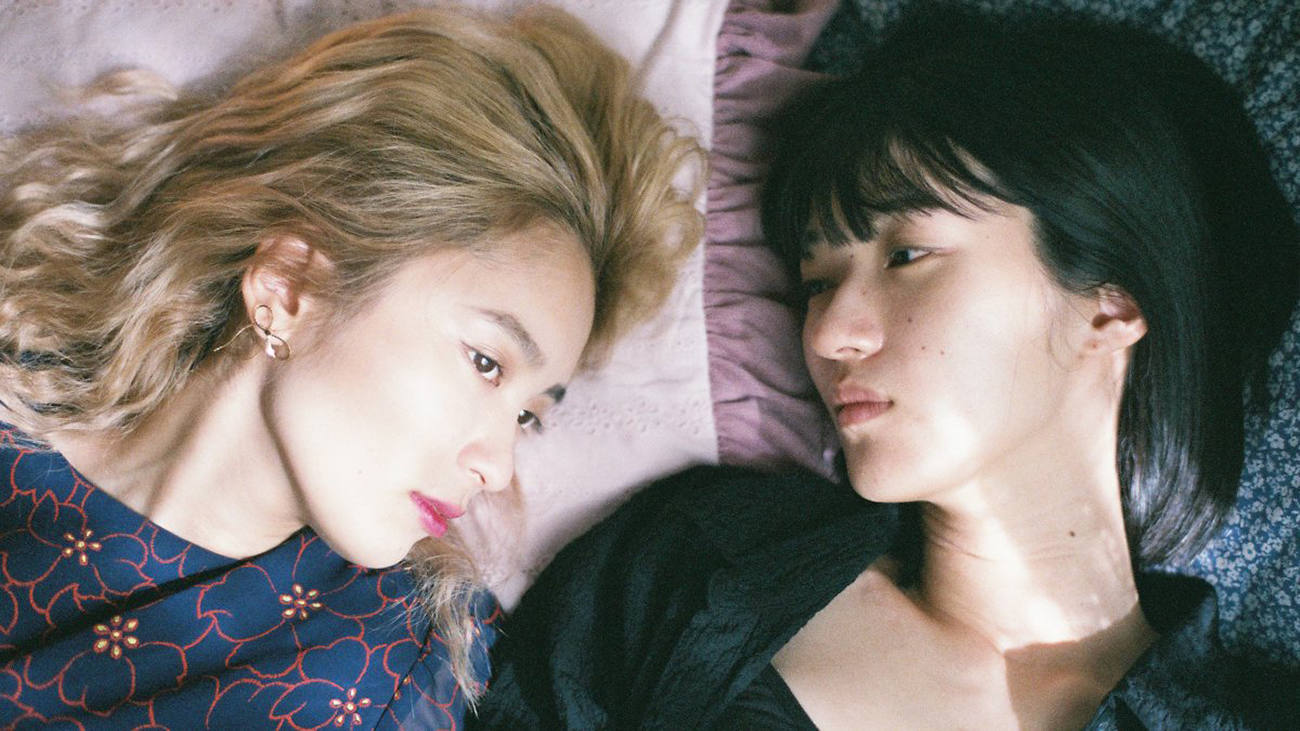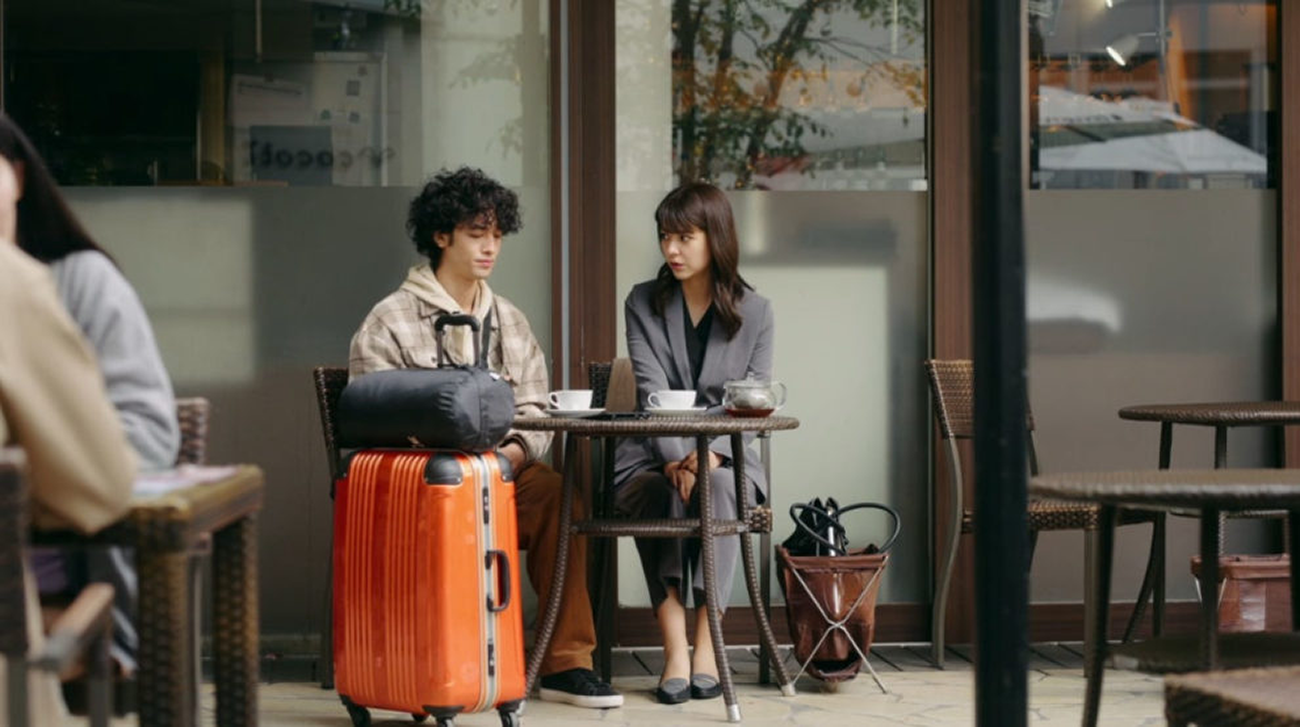Two of Us (dir. Risa Negishi, 2019) and Long Term Coffee Break (dir. Naoya Fujita, 2022) are two short films that picture human relationships and the complications that can naturally arise from them. They were programmed alongside each other at Japan Society’s ACA Cinema Project, “The Female Gaze: Women Filmmakers from JAPAN CUTS and Beyond”. The two films are distinct in their tone of voice and direction: Two of Us experiments with creative elements to portray the depth and diversity of emotions, while Long Term Coffee Break is a more linear and crude take on the subject.

TWO OF US (dir. Risa Negishi, 2019)
Two of Us charts the evolving friendship between Yui (Manami Usamaru) and Hana (Meirin). We follow them as they go through the tides of life and experience changing trust in each other as they face concerns and hardships of their own. It’s a story of love, loneliness and growth.
In this short film, Negishi introduces us to a host of characters and gifts us with a peek into their inner worlds. She manages to do so without getting us lost amongst the many different dynamics. The film’s relationships gravitate around our two main characters. Yui has a niece, Karin, who she’s trying to get closer to, a sister-in-law who seems willing to cut ties, a brother who’s totally absent, and a boyfriend she is trying to find joy in. And she has Hana. Hana has her boyfriend, her grandfather, and Yui.
We discover Hana’s inner circle a little later than Yui’s, and to a different extent, too. This is representative of Hana’s character. Her extroverted, curious and, as described by Yui, “free spirit”, naturally draws people in. But by being so outgoing and attached to the fun parts of life, it’s more challenging for her to open up emotionally.
Yui and Hana have distinct and unique personalities. They might not be complementary, but they bring room for new experiences and knowledge. Director Negishi finds multiple ways to show this. The well thought out costume design reflects their differences. Yui often wears dark and simple clothing, while Hana’s outfits are brighter and more fun. All scenes where their differences are shown are brought to life with a lot of humanity and respect for their own styles. Their first encounter looks like it came out of a ’90s film, the hearty Hana shouting from her window at an unfazed Yui smoking down the street. They have harmless banter by a swimming pool. We find closeness in those moments and the limits to their complicity start to draw as Yui seems to develop stronger feelings than Hana does.
There are many interesting creative elements in Two of Us that are particularly evident in scenes demarcating the differences between Yui’s friendship with Hana and the relationship with her boyfriend, and the emotions they inspire. First, the story is not told in a linear way. Flashbacks and cuts that come in between scenes have their own specific style. There are sections in black and white, different types of framing and close-ups, use of VHS format, rewinding sequences and slow-motion. This versatility when it comes to filming and editing helps to illustrate the characters’ inner worlds. There is a sequence where we see Yui and her boyfriend, followed by a shot of Yui staring into a static vintage TV. Without needing words, this sequence shows that Yui is not finding in her boyfriend the kind of love she wants to replicate from her friendship with Hana. Black and white scenes come cutting right in the middle of vibrant scenes and show the characters’ heavy hearts. Contrary to what we at times expect of black and white, the film doesn’t always utilise it to show the nostalgia of the past, but more so the emptiness that characters feel in the present day. It’s particularly striking during Yui and Hana’s first encounter. We’re watching the newly introduced friends laughing and talking about art, when suddenly, the scene cuts to a black and white shot of Yui and her boyfriend in an art gallery. But there, the atmosphere completely changes. Around her boyfriend, Yui seems completely disengaged, far from the lighthearted laughs coming from her moments with Hana. The sound design and music also collaborate in giving us further context as to Yui and Hana’s relationship. It makes us wonder, how do we find our place among people we truly love, and how do we find and keep it among unnecessary noise?
Coupled with the varied filming and editing techniques, the dialogues that are few and rich paint the themes of the film well. Some of the characters make the effort of communicating with each other, and it’s a relief to see. Yui and her niece Karin get to talk about their thoughts and feelings, sharing their fears in a simple way.
In parallel, it takes Yui and Hana longer to confess about deeper emotions, but eventually, awkwardly, they do get there. In many aspects, the film is subtly treating what may be Yui’s queer desire for Hana. As their friendship develops, it’s clear that some things are being left unsaid, and characters are not always truly hearing each other. But as we approach the ending, our two characters not only make more room for their honest thoughts and feelings, but also receive each other’s hearts with a lot of grace and openness; from Yui’s ask for reassurance after confessing, to Hana’s gratefulness for Yui’s courage. Two of Us doesn’t stop at the longing that is familiar to a lot of queer films. While desire that doesn’t lead anywhere is a real experience, it’s refreshing to see this theme treated in a different way.
Communicating is not always an easy task. There are a lot of scenes in Two of Us that show just how much pain can be the result of poor communication. However, similarly to the effort that speaking our minds might represent, director Risa Negishi uses her creativity to show the characters’ attempts at improving in different contexts. It doesn’t mean growth is easy, and it doesn’t mean poor communication is an aberration. It is simply important to try. The film shows this with a lot of simplicity, and we can applaud Risa Negishi for handling the themes of growth with a lot of creativity and humanity. Two of Us is a film that shows us loneliness among all ages, but more than that, it gives attention to the glimpses of hope, and to the moments of joy and growth that can arise from aimless times.

LONG TERM COFFEE BREAK (dir. Naoya Fujita, 2022)
While Two of Us is focused on how difficult it can be to communicate with those we care for most, Long Term Coffee Break starts with a conversation that sparks a rising relationship then falls as communication begins to fail.
Long Term Coffee Break tells us about the unusual encounter between Naoki (Sano Hiroki), an actor whose life is all about acting, and Yuko (Fujii Mina), a busy employee from a big corporation. They meet at a café where Yuko is doing out-of-office work, and Naoki approaches her on the basis that she’s gorgeous. Quickly, their conversation steers towards how Naoki lives one day at a time, hopping from one stranger’s house to another. If Yuko finds it unusual, she’s also interested in the conversation that was just sparked.
They find an arrangement where Naoki sleeps at Yuko’s place. One night becomes many nights, and soon this is what their future is made of. We get a sweet sequence of shots showing us two people heading to work and back home together. Yuko tells Naoki that she wants her home to be comfortable, Naoki shows Yuko his coffee grinding technique, they watch his acting gigs on TV. It’s heartwarming. After a couple of minutes, Naoki’s voiceover tells us this is how they got married. Unfortunately, their new-found love is short-lived, and what we’re shown next is the decline of their relationship and happiness.
A few elements in the film gives us cues as to Yuko and Naoki’s fate. Firstly, the title of the film. Indeed their relationship could have stayed a simple coffee break. Sometimes, things are not meant to be forced longer. Secondly, all through the film, Naoki’s suitcase is waiting at the entrance of Yuko’s flat. This works as a metaphor for his readiness to leave if the going gets tough.
For most of the film, Yuko and Naoki live through moments of uncertainty. Their needs change but are not addressed. Past the point of their marriage, they cannot relate to each other anymore and neither of them feels cared for. It’s clear that both characters get more and more unhappy with the state of their lives and relationship because of their inability to communicate.
This could be an interesting and relatable story for many. However, the writing of the characters makes it laborious to connect with them. It’s difficult to watch them failing to relate to each other, and to anyone else for that matter. This is the case when Makiko (Mayuko Fukuda), a friend of Naoki, comes to find Yuko and Naoki after learning about her pregnancy and her husband’s adultery. The couple extends no warmth towards Makiko who is left alone in her distress. Loneliness in different seasons of life is a universal experience, and is a poignant trope in Two of Us. In Long Term Coffee Break, however, it turns it into a far more sour rendering due to the unpleasantness of the characters. With each new scene showing another level of mistrust, the pacing is puzzling and quickly becomes draining to watch.
Though at first glance Long Term Coffee Break seems to be a film that will portray slice-of-life events with a touch of humour, some of the writing feels absurd and out of touch with reality. This is particularly the case for a plot thread featuring Yuko’s colleague. She has an affair with her manager, the workplace quickly becomes a gossiping echo chamber and Yuko’s coworker gets fired. Director Fujita first shows that her redundancy is extremely discriminatory and that her manager will be coming out of this unscathed. Later, however, we learn that she’s now stabbed her former manager. This characterisation of people involved in infidelity feels very unsympathetic and needlessly melodramatic. Writing this character off with a stabbing offense for the sake of revenge feels lazy.
There is thankfully a consolation point where Yuko finally lets her unhappiness be voiced, but by then, we’ve already tuned out. Perhaps it’s the format of the film that does not quite work with the themes that director Fujita wants to touch upon. A longer running time could make the film feel less rushed, allow more room for the characters’ personalities to shine and for director Fujita’s to paint the complexity of relationships with compassion. There’s doubt however as to how likely this would be. It seems that the treatment of relationships and of the characters is just how the director envisioned it, making Long Term Coffee Break as a longer feature could just turn out to be equally unsatisfying. The film ends with the same jazzy tune that opened it, but we can’t help but feel a little flat.
Two of Us and Long Term Coffee Break are very distinct films handling people’s inability to communicate and how they appreciate the people around them in different manners. Two of Us is very rich in emotions and graceful in its treatment of it, while Long Term Coffee Break has a more surface level approach to relationships. It can come as a surprise that the two films were programmed together, but both are stories you could hear from different people in your life; it’s up to you which you are more comfortable engaging with.
